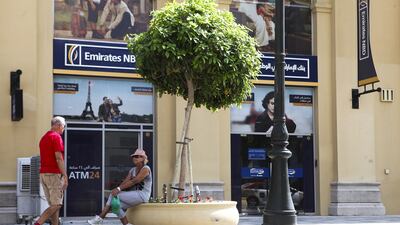UAE bank profits boomed as a bumper crop of second-quarter results show that lenders benefited from lower provisioning costs.
Emirates NBD said net profit for the past three months rose 26 per cent to Dh1.65 billion from Dh1.31bn in the year-earlier period. The bank undershot average analyst expectations by 3.8 per cent because of higher-than-expected provisioning.
Its net income from fees and commission rose 7.7 per cent, while revenues from Islamic finance and conventional financing increased 14 per cent and 4.8 per cent, respectively.
Non-performing loans fell to 7.4 from 7.7 per cent in the first quarter.
“Emirates NBD has addressed its legacy issues [bad debts from exposure to Dubai World following the global financial crisis in 2008], its non-performing loans are falling, and the cost of risk has fallen,” said Shabbir Malik, a banking analyst at EFG-Hermes in Dubai. “The cost of provisioning will probably fall further, which will help profits in the future.”
At Mashreq, second-quarter net profit rose 10 per cent to Dh643.3 million from Dh584.9m in the year-earlier period, while its first-half profit climbed 12 per cent.
Emirates Islamic said its second-quarter net profit shot up 91 per cent to Dh253m from Dh132.5m for the same period last year. This was thanks to a substantial fall in the cost of provisioning – from Dh167.9m last year to Dh65.6m this year.
“The strong earnings trend is because of falling provisioning costs,” said Mr Malik.
Aarthi Chandrasekaran, a senior research analyst at NBK Capital, said UAE banks were expected to enjoy healthy loan growth in the high single digits.
“Asset quality is likely to be stable, and provisioning should ease,” she said. “Dubai-based banks in particular will have a strong quarter because they have a lot of customer deposits, which gives them leeway for cheap funds and good margins.”
Jaap Meijer, the head of research at Arqaam Capital, said last week that he was anticipating a “robust quarter” because the “provisioning cycle is fully behind us”.
Arqaam expects that the banks it monitors will achieve average earnings growth of 15.9 per cent in the second quarter.
UAE banks have shifted to fee-generating business lines because of historically low interest rates, which have put pressure on spreads – the difference between the price at which a bank borrows funds and the price at which it lends them.
Expected interest rate rises in the United States are likely to benefit UAE banks, as the Central Bank raises its lending rates in tandem. Higher rates tend to benefit banks because they make it easier for banks to lend funds at wider spreads, according to Mr Malik.
But a fall in real estate prices over the next six months could harm bank margins, he said.
“The softening real estate market could affect both growth in the loan book and loan quality – and that is a risk for the banking sector as a whole,” he said.
With the IMF revising down its economic growth forecasts for the UAE three times in the past eight months, slower-than-expected non-oil growth could also hit bank profits in the coming months.
abouyamourn@thenational.ae
Follow The National's Business section on Twitter

